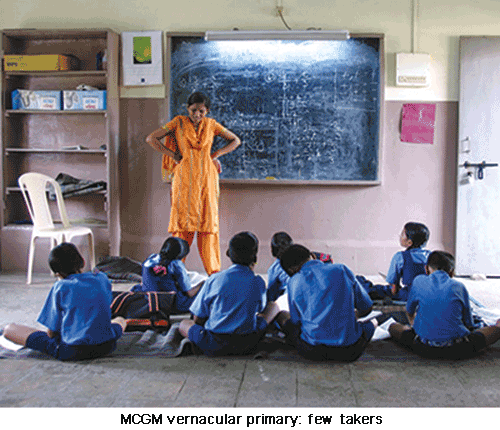 The municipal corporation of Greater Mumbai (MCGM) — the country’s richest municipality with an annual budget of Rs.37,052 crore (2016-17) — is all set to restart its 35 vernacular-medium primary schools as ‘semi-English’ primaries (classes I-VIII) in the new academic year beginning June. All these 35 primaries were shut down last September due to zero student enrolments in class I. But the consensus of opinion among academics in Mumbai is that this half-hearted initiative won’t arrest the mass exodus from MCGM’s primaries which have acquired a notorious reputation for ill-conceived government intervention, teacher absenteeism and poor learning outcomes.
The municipal corporation of Greater Mumbai (MCGM) — the country’s richest municipality with an annual budget of Rs.37,052 crore (2016-17) — is all set to restart its 35 vernacular-medium primary schools as ‘semi-English’ primaries (classes I-VIII) in the new academic year beginning June. All these 35 primaries were shut down last September due to zero student enrolments in class I. But the consensus of opinion among academics in Mumbai is that this half-hearted initiative won’t arrest the mass exodus from MCGM’s primaries which have acquired a notorious reputation for ill-conceived government intervention, teacher absenteeism and poor learning outcomes.
MCGM owns and manages 1,230 schools which provide free primary education (classes I-VIII) to 383,485 children from low-income households in India’s commercial capital. Students have the option to choose one of eight languages — Marathi, Gujarati, Hindi, Kannada, Tamil, Telugu, Urdu and English — as the medium of instruction. It also has 575 ‘semi-English’ schools in which English is a subject in classes I-IV and the medium of instruction for mathematics and science in classes V-VIII.
According to State of Municipal Education in Mumbai 2016, a report of the Praja Foundation, a voluntary organisation that tracks the performance of MCGM schools, there has been a sharp decline in class I enrolments of all vernacular primaries between 2010-11 and 2015-16. For instance, the number of students in MCGM’s Marathi-medium schools decreased by 38 percent between 2011-12 (116,086 students) and 2015-16 (71,454). On the other hand, the number of children in MCGM’s English-medium primaries increased by 47 percent from 48,474 in 2010-11 to 71,260 in 2015-16.
Likewise, the number of students in MCGM’s ‘semi-English’ schools has risen from 576 in 2012-13 to 39,409 in classes I-IV, indicating a clear preference even among lowest income households for English-medium or even partial English education. However for language chauvinist reasons, the Shiv Sena — a parochial sons-of-the-soil political party — has insisted on running Marathi-medium (and a sprinkling of vernacular language) primary schools for which there are few takers, even if they are free-of-charge.
Moreover, most MCGM schools lack basic facilities including toilets and have stopped serving free mid-day meals after parents objected to the low quality of food served. “In the next ten years, we will have an education budget for teachers and establishment, but no students,” says the Praja Foundation report.
Monitors of the education scene in Maharashtra blame parochial Shiv Sena politicians who have ruled MCGM since 1997, for the continuous and accelerating flight of children from the corporation’s vernacular including Marathi-medium, schools. “The steady increase in the number of children enrolled in MCGM’s English-medium and semi-English schools as also the steep increase in the number of English-medium private budget primaries in Mumbai and across Maharashtra is compelling evidence that even bottom-of-the-pyramid households want their children to become fluent in English, the global language of business, commerce and upward mobility. MCGM officials cannot use the ‘shift in aspirations’ excuse for the fall in student enrolments. The truth is, over the years, municipal schools have become a symbol of badly managed institutions offering poor quality education. This is apparent as our study shows that even semi-English schools are recording steady increase in enrolments,” says Milind Mhaske, project director of Praja Foundation.
To counter the closure of its vernacular schools, MCGM officials are hoping to rope in corporates to resurrect them under their corporate social responsibility programmes. But unless the BJP-Shiv Sena alliance, which is likely to combine to rule over MCGM following the recent municipal election in Mumbai, pays attention to parents’ aspirations and squarely addresses the medium of instruction and quality of education issues, the future of MCGM’s primaries is bleak.
Dipta Joshi (Mumbai)